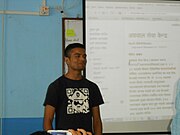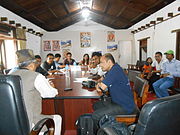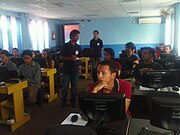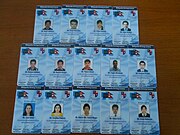The Nepali Wikipedia has a great history. In 2002, one year after the establishment of the English Wikipedia, the Nepali Wikipedia was formed, but our journey was not as fast as it perhaps could have been. After 11 years, in 2013, Wikimedians of Nepal was recognized as a user group, and one of our first steps as an official group was to do a pilot of the Wikipedia Education Program in Nepal. It was not easy, as we didn’t have any kind of existing organization at a university, but our pilot was a success!
First, we looked for a suitable educational partner for our pilot course. We used the criteria that the college must have an acceptable minimum of resources, including individual machines (computer/laptop), Internet availability, electricity backup and available time. We talked with a few institutions and ultimately selected Islington College in Kathmandu.
The journey started with an orientation for roughly 150 students, covering what Wikipedia is and background about the Wikipedia Education Program. We distributed a registration form to participate in our pilot program, and from the people who filled out the form, we selected 50 students. These students participated in a three-day training to make them more familiar with Wikipedia. Based on their interest and performance in this training, we selected 25 final participants for the Wikipedia Education Program pilot in Nepal. Students we selected were supposed to complete a 12-week assignment to write Wikipedia articles.
We scheduled the class two days per week (Monday and Thursday). We started the course by teaching skills needed to write Wikipedia articles, and we cultivated an understanding of free licenses and copyright. After a few weeks, the real work started. Students working in a team or a pair selected one location near the college as topics for their articles. Students went to the venue and collected all the information, snapped some pictures of it and researched it. After that, students worked together to create the articles.
This approach provided students a good level of confidence and taught them how to explore, how to write, and how to collaborate. Here are some articles they wrote:
- Article : नागपोखरी by Ashok Maharjan and Sajjan Bhattarai
- Article : रुसी सांस्कृतिक केन्द्र, नेपाल by Srijan Karki and Junu Dahal
- Article : डिल्लीबजार कारागार by Sandhya Pokhrel and Monil Adhikari
In the second phase, teachers again asked students to write a new article for Wikipedia, but this time each student had to write individually. The idea of choosing topic was to write an article on something the student was interested in, but the condition was that the article should not exist in any language (so students were not permitted to just translate existing articles). Soon, everyone started working on their selected articles. Each class had different topics, like how to add a reference or citation, how to use infoboxes, or how to assure toic notability and neutrality. Some nice articles they wrote include:
- Article कम्पनी रजिष्ट्रारको कार्यालय, नेपाल by Junu Dahal
- Article मनमैंजु by Ashok Maharjan
- Article : लखन थापा (शहीद) by Shyam Bahadur Sunari Mager
In the third stage, all of the students worked together, so we chose the common interest topic Pashupati Temple. The world heritage site is a popular and prestigious place for Nepalese people. The Executive Secretary of Pashupati Development Trust gave us an hour of his time and explained the site’s historic value, its development, its current status and more. Two staff helped all of the participants visit the temple and explain each important detail and they provided published books to us for more information. Students worked together to build a beautiful article: पशुपतिनाथ मन्दिर.
Some of the other articles they worked on are here: विकिपीडिया शिक्षा कार्यक्रम १
In the end, 15 students presented what they built and what they learned. As recognition, we provided the students with a certificate showing the score they obtained and a special “Wikipedia Driving License.” This was the journey from 150 students to 15 excellent students, so I must say this was also one of the most important learnings for our team.
Last week we had a review meeting with the college administration. We discussed the result, the achievements from both sides, and ways that we can improve the program. Getting 15 students sounds good, but still we felt like we missed some students who joined and our task is to find out why. We talked about the best case for next time and we are thinking about implementing a Train the Trainers model.
After this exercise, we are feeling more confident about running this program and we are looking forward to implementing our learnings in the next course we run!
Prakash Neupane
Wikimedia Education Team
Wikimedia Nepal

Can you help us translate this article?
In order for this article to reach as many people as possible we would like your help. Can you translate this article to get the message out?
Start translation






